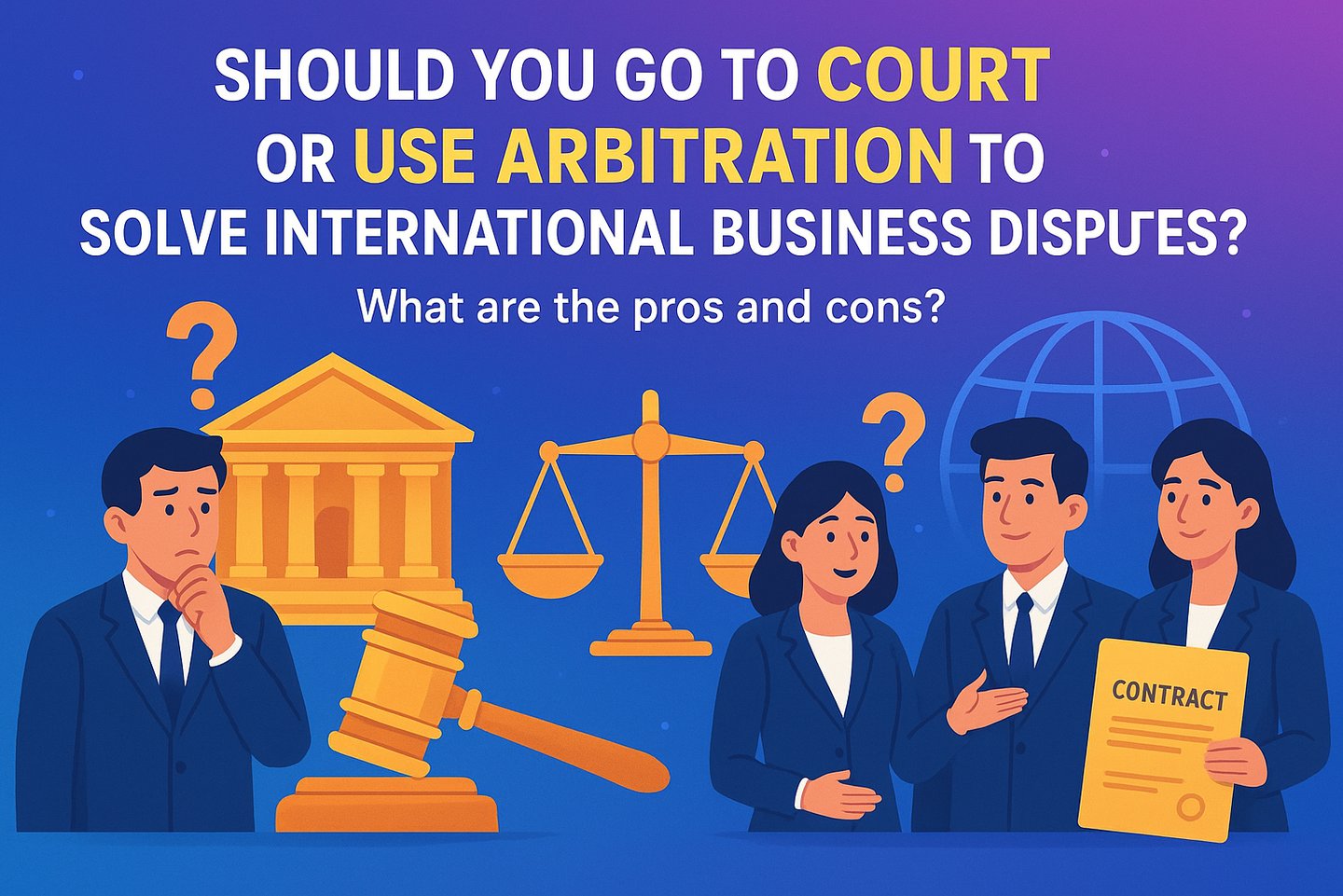Should you go to court or use arbitration to solve international business disputes? What are the pros and cons?
Selecting the most suitable option between court litigation and arbitration is a mutual decision in managing international trade disputes. Although arbitration has the benefits of flexibility, confidentiality, and quick resolution, courts present procedural safeguards as well as the appeal process. Thorough assessment of the mechanisms enables the companies to check the commercial interests and consequently reach results that are more certain.
CORPORATE LAWS
Aditya Jain
10/30/20253 min read


INTRODUCTION
The fact that differences in law, culture, or contract interpretation will definitely result in problems as cross-border business transactions become more involved is beyond dispute. Such disputes entail high stakes and usually impact large investments and long-standing relationships. Traditionally, global companies have turned to the courts of the host country for redress. However, due to its neutrality, procedural flexibility, and recognition in different countries, arbitration has been taking the opportunity for international dispute settlement. This article discusses, in depth, the difference between arbitration and litigation, and which is more suitable to deal with the problems mentioned.
UNDERSTANDING ARBITRATION AND LITIGATION
Arbitration, which is a private process controlled by the parties' contract, allows the parties to appoint one or more impartial arbitrators to resolve their dispute quickly and quietly through arbitration. According to international treaties such as the New York Convention, the decision, which is in the form of an arbitral award, can be accepted and executed in more than 160 regions. Its procedural rules are adaptive and often tailored through the arbitration agreement. While litigation involves the settling of disputes in a public court following the process of common law and statutes.
Courts tend to render more frequent public decisions, rely on judges put into place under administrative practices, and present a range of possible solutions that can be appealed.
ANALYTICAL COMPARISON
PROCEDURAL AUTONOMY AND EXPERTISE
One of the strengths of arbitration is party independence. To achieve impartiality and suitability to the international environment, the disputants have the right to change the rules, language, and venue of the hearing. Unlike litigation, where judges are selected without consultations with parties, parties can select arbitrators who may have the relevant technical or business knowledge. This factor may be critical to global firms that work in specialized sectors such as technology, building, or transport.
Litigation, on the other hand, is inherently less versatile. The processes in courts are rigid; they are guided by statutory provisions and are often not suitable to cross-border differences. Judges will lack industry knowledge of complex business cases, although they may be very skilled in the law.
CONFIDENTIALITY AND PUBLICITY
Privacy is another important element of arbitration. Proceedings, filings, and decisions are typically confidential in order to protect the reputations and company secrets. In a court of law, where records are visible through documents and hearings, it is impossible to be as secure. This difference is vital to individuals who fear that sensitive information can be leaked.
TIMELINESS AND EFFICIENCY
Relativism of expediency in arbitration is lauded. Reforms in the speed of resolutions are often the outcome of simplified evidentiary processes and not full dockets. Nevertheless, even arbitration may be time-consuming and costly where parties are combative or employ the maneuver of tactical delay—particularly in multi-party discontent when the stakes are high.
Light, in comparison, the litigation process usually takes years to come to fruition due to institutional backlogs and the complexity of the procedures themselves. Many stages, such as appeals, increase cost and time.
COST CONSIDERATIONS
Arbitration is not always cheaper, as it may not be true. Arbitration can reduce the longer discovery and other legal expenses; however, the benefits could be traded off against the arbitrators' fees and institutional expenses, especially when the arbitration process is lengthy. In a good judicial system, simple cases can be litigated at lower costs than complex, protracted cases.
BINDING NATURE, APPEAL, AND ENFORCEABILITY
Arbitration offers a final and binding resolution of the case; appeals are only possible when the case is of extreme misbehavior or a procedural defect. This ensures that there is clarity and closure, but it also exposes parties to the risk of committing an error that is unlikely to be rectified. Litigation makes it possible to review appellate cases and safeguard against apparent errors but adds uncertainties and delays.
With regard to enforcing it, an arbitral award decided under the New York Convention often possesses a broader global scope than a court decision, which might face problems in other jurisdictions unless there are mutual enforcement accords between the two countries.
INTEGRATED ASSESSMENT
In deciding whether to use arbitration or litigation, businesses have to look at several variables. Arbitration tends to be selected when the privacy, flexibility of procedures, or industry-specific information is of critical importance. Litigation is not yet completely the way to go in cases in which broad remedies, procedural protections, or case law are of concern. Experienced contractual parties often make use of the hybrid agreements, which involve arbitration with a possibility of seeking immediate court intervention to enforce or receive temporary relief.
Studies indicate that arbitration is increasingly being used in foreign disputes and that the relationships and enforceability are more significant than strict adherence to local law processes. But where there are issues that are criminal, regulatory, or even those that are of a public policy, then courts may be unavoidable.
CONCLUSION
The nature of the disputes, whether it is arbitration or litigation, depends on the parties involved in terms of their commercial interests, risk, and the nature of the dispute. Arbitration limits the discretion of appeal and can be extremely costly, but it is secret and experienced and globally enforceable. Even though the litigation ensures the safeguarding of precedent and procedures, time and confidentiality are commonly lost. In writing a contract, parties should consider such factors and document their preference of dispute resolution. Altering the conflict environment to the anticipated setting mitigates risk and promotes swift and effective restitution.
